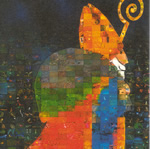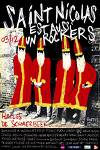Her Bad Mother
Saturday, December 23, 2006
Wednesday, December 20, 2006
Many Impossible Things

The other morning, I was idly scanning the newspaper while supervising Wonderbaby’s breaking of the fast (corn puffs and an orange and waffles spread with apple butter), when I happened upon this headline: Imagine there’s no Santa.
There’s a happy holiday headline, I thought. I read further. It was an op-ed piece by a woman with school-aged children, concerning her discomfort with the Santa myth and her decision to not let her own children be misled by that myth. I just can’t do it, she said. I just can’t shake the feeling that my sons need to be able to trust that all their parents ever told them was the truth. This, because the story of Santa is, of course, not true.
Of course.
If you were to ask me, casually, if I thought that the most familiar Santa stories – ‘Twas the Night Before Christmas, Rudolph, et. al. – were based on fact, I would say no, of course. I don’t believe that a fat man in a red suit runs a sweatshop, exploiting cheap elvin labour, at the North Pole. I don’t believe that he keeps a list of who’s naughty and nice, nor that he flies around the world Christmas Eve, dispensing gifts and small bits of coal according to the dictates of that list.
I don’t believe that reindeer really do know how to fly.
But neither do I believe that Santa stories are lies.
Plato wrote, a very long time ago, before there was a Christmas or a Santa or anything of the sort, that there is a very important difference between what he called lies of the soul and verbal lies, or lies in speech. A lie of the soul, he said, is a lie that misguides the soul, misdirects the soul away from truth. It’s a lie that causes the soul to become confused, and so, ultimately, unhappy. A verbal lie, on the other hand, might be as simple as a little white lie, told to avoid hurt, or it might be something more noble. A noble lie is a lie in the sense that it veils the truth, but it veils the truth in such a way as to make it comprehensible to those who are unable to grasp truth in its fullness. It orients the soul to truth, without revealing truth openly (the truth being like the sun – it can be blinding, and so we must, most of us, shield our eyes.)
When I teach the story of the noble lie (which appears in Plato’s Republic) to my undergraduate students, they usually respond, initially, with indignation. It’s a lie, they say. It is meant to deceive, and deception is bad. Yes, I say, deception is bad. But not all fiction is deceptive. I remind them of origin stories, the story of the Garden of Eden and of the Fall (which, forgive me, I do not regard as plainly factual); I remind them of fables and myths; I remind them of the stories that we tell children, stories that we use for the purposes of teaching.
 Stories like that of Santa, which, I think, teaches something about generosity and goodness and the idea that all children deserve to be (even if they are not in fact) loved. That the best way to celebrate Christmas is to give gifts without the expectation of reciprocation, to quietly slip a little happiness into the stockings of others. (We could, of course, go darker with this story, and expand upon the ‘naughty and nice’ proviso, and say something about cold and coal-dark hearts being undeserving of gifts, but I am skeptical of the quote-unquote truth of this part of the story and so I will likely – because it does not accord with the quote-unquote truth that I wish to communicate to my children – delete it from the version of the story that I tell them. Such is the power of the parent, who as primary storyteller is both poet and philosopher-ruler.)
Stories like that of Santa, which, I think, teaches something about generosity and goodness and the idea that all children deserve to be (even if they are not in fact) loved. That the best way to celebrate Christmas is to give gifts without the expectation of reciprocation, to quietly slip a little happiness into the stockings of others. (We could, of course, go darker with this story, and expand upon the ‘naughty and nice’ proviso, and say something about cold and coal-dark hearts being undeserving of gifts, but I am skeptical of the quote-unquote truth of this part of the story and so I will likely – because it does not accord with the quote-unquote truth that I wish to communicate to my children – delete it from the version of the story that I tell them. Such is the power of the parent, who as primary storyteller is both poet and philosopher-ruler.)(I could, of course, say something here about religion and the original story of Christmas and the purposes that these stories serve and what it might mean to refer these stories as noble lies. But that is a much longer and more complicated post - and in any case it is a post that I have already attempted - and so you must just accept these concerns as subtext.)

But there’s more to this than the question of whether such stories are deceptive. The author of that article wrote that she taught her children that Santa is a character of fiction, no more real than Muppets and Pokemon. Which is fine, I think – except that when I think of my own childhood relationships to characters of fiction, what I remember most fondly is the wonderful uncertainty of those fictions. Grover might have been real (I still experience shudders of disappointment when I see pictures of Muppets lifeless in the hands of their puppet-handlers). So too Peter Pan, and Alice and the Cheshire Cat, and the Tooth Fairy. And Santa. Those characters, and so many others, were fascinating to me because they made demands upon my imagination – they lived only through my imagination, it was my imagination that sustained them, that made them walk and talk and breath. Had they solely been one-dimensional figures, words and pictures on a page, had I been certain that they were not real, they would have remained flat. Lifeless.
Their stories had force, for me, precisely because those stories occupied and energized that wonderful space between my heart and my mind where truth and story and fact and fiction are blurred, where the impossible and the not-quite-possible and the possible become deliciously tangled, where disbelief is always suspended. They lived - they live - and became real in the space of my imagination.
 I will never try to convince my daughter that the Santa in the mall is the real Santa. I will never insist to her that there is, in fact, a real man in a red suit living at North Pole with a harem of elves. I will never try to make her believe. I will, however, tell her stories about Santa (of all varieties), and I will tell these in my most assured voice, with my most sparkling eye, with my most animated gestures. And if she asks me whether Santa is real… well, I suppose that I’ll be honest with her. I’ll say that real can mean many things; I’ll say that sometimes it’s enough to believe in something with all your heart to make that thing real in many of the ways that count (to love that thing, to derive hope or comfort or inspiration from that thing). I’ll say that while I can’t personally confirm that there is a Santa who lives at the North Pole (never having been there myself), that doesn’t mean that it isn’t possible that there is a Santa. I will say that it is, in any case, important to believe, sometimes, in impossible things. I will say, with the Queen of Hearts, that I myself have been known to believe in as many as six impossible things, all before breakfast.
I will never try to convince my daughter that the Santa in the mall is the real Santa. I will never insist to her that there is, in fact, a real man in a red suit living at North Pole with a harem of elves. I will never try to make her believe. I will, however, tell her stories about Santa (of all varieties), and I will tell these in my most assured voice, with my most sparkling eye, with my most animated gestures. And if she asks me whether Santa is real… well, I suppose that I’ll be honest with her. I’ll say that real can mean many things; I’ll say that sometimes it’s enough to believe in something with all your heart to make that thing real in many of the ways that count (to love that thing, to derive hope or comfort or inspiration from that thing). I’ll say that while I can’t personally confirm that there is a Santa who lives at the North Pole (never having been there myself), that doesn’t mean that it isn’t possible that there is a Santa. I will say that it is, in any case, important to believe, sometimes, in impossible things. I will say, with the Queen of Hearts, that I myself have been known to believe in as many as six impossible things, all before breakfast.All of which is to say that I will encourage her to reach her own conclusions, and that I will encourage her to be broad-minded in pursuing those conclusions, in pursuing understanding of seemingly impossible things. I will give her the opportunity to believe, to embrace the stories and let them live in her imagination. I will let her have her Santa, whatever that means, if she wants him.
 Until it all gets too Sears Portrait Studio, at which point we'll have to kill Santa off.
Until it all gets too Sears Portrait Studio, at which point we'll have to kill Santa off.
(Audience participation! What do you tell your children about Santa?)
**********

Monday, December 18, 2006
The Gift of the Magi
Most unwise, we are told, are these givers of these useless gifts, made useless by having been given unwisely. Most unwise, especially, when considered against the Magi, the wise men, who originated the practice of Christmas gift-giving when they brought gifts to the baby in the manger, gifts that were without a doubt, according to O. Henry, wisely chosen and wisely acquired: gifts with utility, with exchange-value; gifts that could be exchanged if duplicated or found to be useless. Why, then, he asks us rhetorically, does he bother with a story of two foolish children, whose gift-giving was unwise?
He bothers with the story, O. Henry says, because these two gift-givers, so apparently foolhardy in their giving, were in fact the wisest of gift-givers. Not – on my reading of the story – simply because they sacrificed to give, but because they sought, at any cost, to give gifts of the heart. They were directed, in their gift-giving, solely by love – not by utility or exchange value or convenience or any of the conventionally ‘wise’ criteria that are applied to the art and science of gift-giving. They sought to give that which would most touch the heart of their beloved; they gave from the heart, to the heart.
The gifts that I have been witness to this past week - the gifts to my nephew, which were and are in fact and effect gifts to me - have been wise gifts by any criteria. These have been practical gifts – you have, those of you who contrived and executed the auction and the letter drive and those of you who spread the word and participated, given gifts of eminent practicality and utility. The money raised by the auction* will help the cause of furthering research into the disease that will take my nephew, research that will, one day, save the lives of little boys – if not in time to save my nephew’s life, then in time to save some other beloved nephew, son, grandson, friend. There is no more practical gift, no more useful gift – no gift more immune to the vagaries of exchange-value, to the risks of duplication – than the gift that helps to save a life, any life.
But there’s more to these gifts than their practicality and utility. These gifts – the gifts of time and money and energy and word that went into the auction and the letter-drive – have been the wisest gifts, and you the wisest gift-givers, for the fullness of heart in these gifts, for their embeddedness in heart, for the fact that they demonstrate so completely the power of heart and love and for the fact that they simply demonstrate that there is so much heart and love and goodness out there. That the world holds so many Magi.
I don’t know quite how else to put this, to put my feelings, my gratitude, the burstingness of my heart, into words other than to say this: I have never, ever, been given such gifts. Yes, of course, I have been blessed with the gifts, the heaven-sent gifts, of life, love, child, family, friends. These are immeasurably precious, of course. But never have I received such an overwhelmingly generous gift, such a grand gift, as the unexpected orchestration of this most amazing gesture, this series of gestures, this outpouring of love for my nephew on my behalf. It has left me speechless, wordless, astounded. It has, in some moments, left me in puddles – great, sopping puddles – of tears. Happy tears, grateful tears.
Love is not a gift that you can use, in any conventional sense. It is not a gift that has monetary value or exchange value or use-value in any strict sense, capitalist or Marxist or Maussian or otherwise. Love is functionally useless, effectually valueless, as a gift. But it is the greatest gift. The wisest gift.
This week, you've given it to me in spades. You are the Magi.

click image (me make button!)
(take button! take! take! e-mail me for code)
This is the least that I could do, by way of thanks, for now. It's not combs for your hair, or platinum fobs for your gold watches, and I didn't sell any prized possessions to acquire it. It's just a little linkage. Which is to say, it's you, wrapped up nice and given back to you. Visit, and enjoy - this is your love, all in one place.
(It's wonderful.)
*Over $3000 dollars raised by the auction! $3000+ dollars to go to MD Canada in Tanner's name. THANK YOU.
********
Please let me know if I missed your post about the auction, or if I failed to notice that you posted an auction button, or if I did notice and just plum forgot. If you participated in the auction by bidding/raffling/telling your friends/wishing on a star, or if you helped your children to write letters (which you can still do - there's no deadline for this most wonderful project), and would like to be linked up on the Official Magi List, drop me a comment or a line. And if you'd like your own button (my first ever attempt at button-making!), let me know and I'll send it to you.
********
 Her Bad Mother got tidal waves of love and a Dad Gone Mad t-shirt and all WonderBaby got was this stupid orange.
Her Bad Mother got tidal waves of love and a Dad Gone Mad t-shirt and all WonderBaby got was this stupid orange.
 Scam.
Scam.

